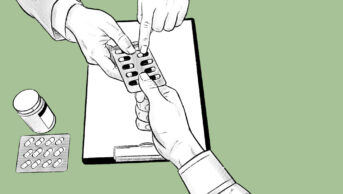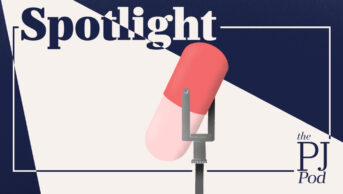
Dr P Marazzi / Science Photo Library
Some 44% of off-label prescriptions written for antidepressants lack strong scientific evidence for the condition they were prescribed for, a new study shows.
Researchers found that only 16% of off-label prescriptions were supported by evidence. And although another 40% lacked the necessary evidence for the condition prescribed, there was strong evidence to support an alternative product in the same class of antidepressant.
The findings are based on an analysis of 106,850 antidepressant prescriptions written by 174 physicians for 20,920 adults between January 2003 and September 2015 in Quebec, Canada.
The results, they say, reinforce the importance of considering the evidence when prescribing off label and, when the evidence is lacking, physicians should prescribe with caution.
Publishing their study in The BMJ
[1]
(online, 21 February 2017), the researchers say their findings also reveal an “urgent need to produce more evidence on the risks and benefits of off-label antidepressant use and to provide physicians with this evidence at the point of prescribing”.
They suggest that indication e-prescribing systems that are integrated with clinical-decision-support tools would improve the quality of off-label prescribing because they would notify physicians when drugs are being prescribed off-label without supporting evidence and provide them with access to up-to-date summaries of the available evidence.
Tricyclic antidepressants had the highest prevalence of off-label indications (81.4%, 95% confidence interval, 77.3% to 85.5%), the researchers discovered.
Trazodone prescribed for insomnia was the most common off-label use for antidepressants, accounting for 26.2% (21.9% to 30.4%) of all off-label prescriptions.
Only 15.9% (13.0% to 19.3%) of all off-label prescriptions were backed by strong scientific evidence for the indication.
For 39.6% (35.7% to 43.2%) of off-label prescriptions, the prescribed drug did not have strong evidence but another antidepressant in the same class had strong evidence for the respective indication.
For the remaining 44.6% (40.2% to 49.0%) of off-label prescriptions, neither the prescribed drug nor any other drugs in the class had strong evidence for the indication.
Commenting on the study, Ciara Ni Dhubhlaing, a senior pharmacist at St Patrick’s University Hospital, Dublin, who is registrar of the College of Mental Health Pharmacy, says off-label prescribing is something that is frequently seen, particularly in primary care and non-mental health settings.

Source: Courtesy of Ciara Ni Dhubhlaing
Senior pharmacist Ciara Ni Dhubhlaing says the greatest proportion of off-label antidepressant prescribing in the UK and Ireland is likely to be reflective of that identified in this study
“The risks of this include adverse effects, and lack of efficacy when not used in line with the evidence base [which leads] to polyprescribing. It is a concern within the field of mental health due to the potential for serious adverse reactions such as serotonin syndrome in patients prescribed multiple serotonergic agents, for example, an SSRI for depression with amitriptyline and tramadol for pain management.”
She thinks prescribers may be unaware of a medicine’s license and assume a class effect for example, SSRIs for anxiety, when only escitalopram and paroxetine are licensed for generalised anxiety disorder within that class.
She does point out that some off-label uses such as amitriptyline for pain-management are a widely recognised indication and recommended by NICE guidelines.
“However, the greatest proportion of off-label antidepressant prescribing in the UK and Ireland is likely reflective of that identified in this study – use of low doses of tricyclic antidepressants (TCAs) for insomnia. In this instance prescribers may see the antidepressant as a safe and effective alternative to hypnotic prescribing without the risk of dependence.”
Whilst insurance company formularies are identified as a contributory factor in off-label prescribing in this study, she says, use of formularies and guidelines can highlight licensed medicines in preference to unlicensed medications from the same drug class.
“[A] reduction in off-label use would increase the incentive for drug companies to fund studies that broaden their list of approved indications and therefore add to the overall evidence base for antidepressants for indications other than depression,” she adds.
References
[1] Wong J, Motulsky A, Abrahamowicz M et al. Off-label indications for antidepressants in primary care: descriptive study of prescriptions from an indication based electronic prescribing system. BMJ 2017;356:j603 doi: 10.1136/bmj.j603


